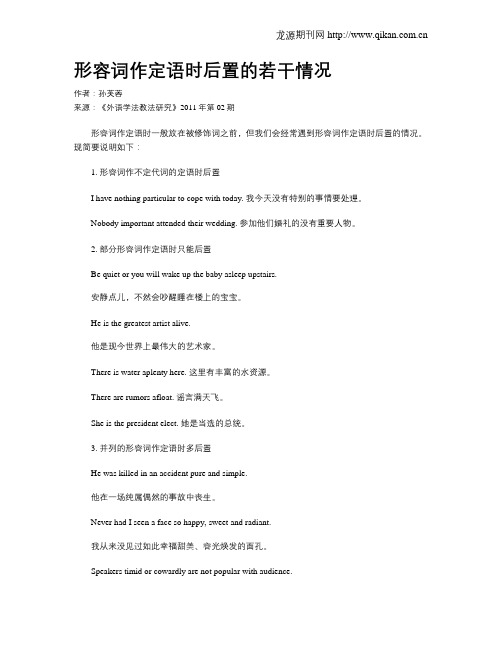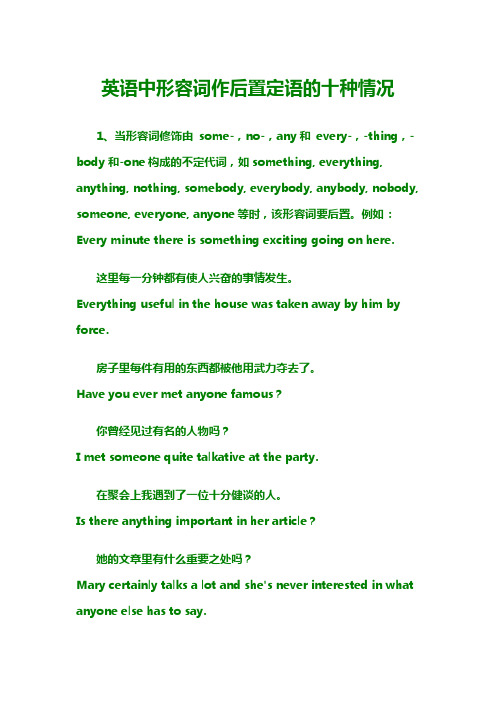英语中形容词作后置定语的十种情况
英语中形容词作后置定语地十种情况

英语中形容词作后置定语的十种情况1、当形容词修饰由 some-,no-,any和 every-,-thing,-body和-one构成的不定代词,如something, everything, anything, nothing, somebody, everybody, anybody, nobody, someone, everyone, anyone等时,该形容词要后置。
例如:Every minute there is something exciting going on here.这里每一分钟都有使人兴奋的事情发生。
Everything useful in the house was taken away by him by force.房子里每件有用的东西都被他用武力夺去了。
Have you ever met anyone famous?你曾经见过有名的人物吗?I met someone quite talkative at the party.在聚会上我遇到了一位十分健谈的人。
Is there anything important in her article?她的文章里有什么重要之处吗?Mary certainly talks a lot and she's never interested in what anyone else has to say.玛丽当然说的太多了,她从来对别人需要说的话不感兴趣。
The doctors have tried everything humanly possible to save his life.医生使用了可能的人道的方法去拯救他的性命。
There is nothing difficult in the world.世上无难事。
There is something wrong with my body. I am not feeling quite myself today.我的身体出问题了,今天我感觉不太好。
英语中形容词作后置定语的十种情况

英语中形容词作后置定语的十种情况
1. 名词作主语的形容词后置。
例如:The movie is interesting.
2. 名词作宾语的形容词后置。
例如:I find the book boring.
3. 物主代词作宾语的形容词后置。
例如:He lost his key.
4. 数词作宾语的形容词后置。
例如:She has two dogs.
5. 不定代词作宾语的形容词后置。
例如:I saw something strange.
6. 感官动词(如see、hear、smell、feel等)后置的形容词。
例如:
I heard something strange.
7. 整体名词后置的形容词。
例如:His shirt is red.
8. 序数词后置的形容词。
例如:He is the first person to arrive.
9. 代词one或ones后置的形容词。
例如:I want the blue one.
10. 由两个或更多形容词组成的形容词短语后置。
例如:It was a long and tiring day.。
形容词作定语时后置的若干情况

形容词作定语时后置的若干情况作者:孙芙蓉来源:《外语学法教法研究》2011年第02期形容词作定语时一般放在被修饰词之前,但我们会经常遇到形容词作定语时后置的情况。
现简要说明如下:1. 形容词作不定代词的定语时后置I have nothing particular to cope with today. 我今天没有特别的事情要处理。
Nobody important attended their wedding. 参加他们婚礼的没有重要人物。
2. 部分形容词作定语时只能后置Be quiet or you will wake up the baby asleep upstairs.安静点儿,不然会吵醒睡在楼上的宝宝。
He is the greatest artist alive.他是现今世界上最伟大的艺术家。
There is water aplenty here. 这里有丰富的水资源。
There are rumors afloat. 谣言满天飞。
She is the president elect. 她是当选的总统。
3. 并列的形容词作定语时多后置He was killed in an accident pure and simple.他在一场纯属偶然的事故中丧生。
Never had I seen a face so happy, sweet and radiant.我从来没见过如此幸福甜美、容光焕发的面孔。
Speakers timid or cowardly are not popular with audience.胆小怯懦的讲演者是不受听众欢迎的。
A man poor but contented enjoys life. 安贫知足者常乐。
但并列的形容词也有前置的情况:One ought to draw the positive and negative historical lessons.大家应当吸取正反两面的历史教训。
(完整版)英语中形容词作后置定语的十种情况

英语中形容词作后置定语的十种情况1、当形容词修饰由some-,no-,any和every-,-thing,-body和-one构成的不定代词,如something, everything, anything, nothing, somebody, everybody, anybody, nobody, someone, everyone, anyone等时,该形容词要后置。
例如:Every minute there is something exciting going on here.这里每一分钟都有使人兴奋的事情发生。
Everything useful in the house was taken away by him by force.房子里每件有用的东西都被他用武力夺去了。
Have you ever met anyone famous?你曾经见过有名的人物吗?I met someone quite talkative at the party.在聚会上我遇到了一位十分健谈的人。
Is there anything important in her article?她的文章里有什么重要之处吗?Mary certainly talks a lot and she's never interested in what anyone else has to say.玛丽当然说的太多了,她从来对别人需要说的话不感兴趣。
The doctors have tried everything humanly possible to save his life.医生使用了可能的人道的方法去拯救他的性命。
There is nothing difficult in the world.世上无难事。
There is something wrong with my body. I am not feeling quite myself today.我的身体出问题了,今天我感觉不太好。
最新英语中形容词作后置定语的十种情况

英语中形容词作后置定语的十种情况1、当形容词修饰由some-,no-,any和every-,-thing,-body 和-one构成的不定代词,如something, everything, anything, nothing, somebody, everybody, anybody, nobody, someone, everyone, anyone等时,该形容词要后置。
例如:Every minute there is something exciting going on here.这里每一分钟都有使人兴奋的事情发生。
Everything useful in the house was taken away by him by force.房子里每件有用的东西都被他用武力夺去了。
Have you ever met anyone famous?你曾经见过有名的人物吗?I met someone quite talkative at the party.在聚会上我遇到了一位十分健谈的人。
Is there anything important in her article?她的文章里有什么重要之处吗?Mary certainly talks a lot and she's never interested in what anyone else has to say.玛丽当然说的太多了,她从来对别人需要说的话不感兴趣。
The doctors have tried everything humanly possible to save his life.医生使用了可能的人道的方法去拯救他的性命。
There is nothing difficult in the world.世上无难事。
There is something wrong with my body. I am not feeling quite myself today.我的身体出问题了,今天我感觉不太好。
英语中定语位置的10条规律

英语中定语位置的10条规律英语中定语位置的10条规律在英语表达中,一个名词常常会有一个或多个形容词或名词做定语来说明其性质、特征、用途等。
考生在解答与这种语言现象有关的题目时,常不知道怎样确定多个定语的排列顺序。
本文拟从九个方面予以探讨性解答,以资备考。
一、前位限定词总在前面。
前位限定词指many,much,any,some,no,(a)little,(a)few等表示数量的形容词,数词one,two,three以及形容词性的物主代词my,his,her,? ,还有all,both,every等不定代词。
如:1.many Chinese students2.two exciting days3.my favorite English songs二、主观词+客观词。
说话人对事物主观性评价的定语在前,客观性评价的定语在后。
如:1.our great powerful motherland,2.the beautiful large garden,3.a comfortable bright meeting-room,4.any lovely clever children三、序数词+基数词。
碰到数词定语时,一般地,序数词在前,基数词在后。
如:1.the first three newcomers,2.the last few weeks3.一How was your recent visit to Qingdao?—It was great.We visited 8 friends, and spent the days at the seaside .A.few last sunny B.1ast few sunnyC.1ast sunny few D.few sunny hst答案B。
四、少音节词+多音节词。
当几个形容词同时修饰一个名词时,还可以根据行文习惯,通过音节的多少来确定定语的顺序。
如:1) an old exalting story2) my new Australian friend3) two tall strong-looking policemen4) a good effective method.五、(制作)方式+材料+用途。
形容词作定语可以后置或必须后置的情况
• ③某些特殊表达:court martial 军事法庭, Poet Laureate 桂冠诗人,等。
• ④成对的形容用作定语,可以后置: • Eg :There was a huge cupboard, simple and beautiful. 有一个大食柜,简朴而美观。
• 少数形容词用作定语时可前置也可后置, 且意义差不多
• ② 形容词enough, opposite等修饰名词时可 前置或后置。 • 如:We have enough time [time enough] 我们有足够的时间。 • He lives in the house opposite [the opposite house]. 他住在对面的房子里。 • 在现代英语中enough 通常放在被修饰名词 之前,若置于被修饰名词之后,则被认为 带有古义或文学味。
• ③ 有的形容词前置和后置均可,但含义不 同。 • 如:I know none of the members present. 在场的成员我一个也不认识。(present=在 场的) • I know none of the present members. 现在 的成员我一个也不认识。(present=现在的)
① last, next, following, preceding, past 等 修饰表时间的名词通常前置,但也可后置:
• 1.next Monday / on Monday next 下周星期 一 • st month / in the month last 上个月 • 3. the following month / in the month following 下个月
• 有些既可用作形容词又可用作副词的词,当它用作 形容词时前置,用作副词时后置。如:upstairs rooms / rooms upstairs 楼上的房间 • 而有些既可用作形容词又可用作副词的词,它虽可 前置和后置,但含义不同。如:overseas students 外国留学生(指外国到本国来求学的学生,等于 students from overseas • students overseas 出国留学生(指本国到外国去求 学的学生,等于students who are overseas)
英语后置定语的用法总结
英语后置定语的用法总结英语后置定语的用法总结如下:1. 形容词作后置定语:单个的形容词作定语,通常放在它所修饰的名词之后。
例如:The climate here is very pleasant.这里的气候十分宜人。
2. 介词短语作后置定语:介词短语作定语时,介词短语的位置也在名词之后。
例如:This is a book of his. 这是他的书。
3. 动词不定式作后置定语:动词不定式作定语的情况不多,多位于被修饰词的后面。
例如:The first textbook to come out in the wake of the new reform is English. 新改革后出版的第一部教科书是英语课本。
4. 副词作后置定语:副词作定语时,一般置于它所修饰的名词之后。
例如:In the world, family is the only place where we can find love, warmth and comfort. 在这个世界上,家是我们唯一能够找到爱、温暖和舒适的地方。
5. 从句作后置定语:从句作定语时,一般置于它所修饰的名词之后。
例如:He found a watch which had belonged to his grandfather in a drawer.他在抽屉里发现了他祖父的一块手表。
6. 名词作后置定语:名词作定语时,通常放在它所修饰的名词之后。
例如:The book of the day is “Alice in Wonderland”. 今天的推荐读物是《爱丽丝漫游奇境记》。
7. 形容词短语作后置定语:形容词短语作定语时,通常放在它所修饰的名词之后。
例如:The little boy, up to his elbows in flour, was baking a cake. 那个小男孩,手肘上沾满了面粉,正在烤蛋糕。
8. 名词短语作后置定语:名词短语作定语时,通常放在它所修饰的名词之后。
英语中形容词作后置定语的十种情况
英语中形容词作后置定语的十种情况1、当形容词修饰由some-,no-,any和every-,-thing,-body 和-one构成的不定代词,如something, everything, anything, nothing, somebody, everybody, anybody, nobody, someone, everyone, anyone等时,该形容词要后置。
例如:Every minute there is something exciting going on here.这里每一分钟都有使人兴奋的事情发生。
Everything useful in the house was taken away by him by force.房子里每件有用的东西都被他用武力夺去了。
Have you ever met anyone famous?你曾经见过有名的人物吗?I met someone quite talkative at the party.在聚会上我遇到了一位十分健谈的人。
Is there anything important in her article?她的文章里有什么重要之处吗?Mary certainly talks a lot and she's never interested in what anyone else has to say.玛丽当然说的太多了,她从来对别人需要说的话不感兴趣。
The doctors have tried everything humanly possible to save his life.医生使用了可能的人道的方法去拯救他的性命。
There is nothing difficult in the world.世上无难事。
There is something wrong with my body. I am not feeling quite myself today.我的身体出问题了,今天我感觉不太好。
英语中形容词作后置定语的几种常见情况例析
英语中形容词作后置定语的几种常见情况例析单个的形容词作定语时,一般放在所修饰的名词之前,但在某些情况下需后置:1. 修饰不定代词时:修饰somebody, someone, something, anybody, anyone, anything, nobody, nothing等复合不定代词的形容词,则必须放在不定代词之后。
如:This isn’t anything important.这并不是什么重要的东西。
Anyone intelligent can do it.任何有脑子的人都能做这事。
There’s nothing wrong with the machine.机器没有毛病。
Let’s talk about something interesting.我们来谈论一些有趣的事吧。
2. 形容词短语作定语时:形容词短语作定语必须放在所修饰的名词之后。
如:I think he is a man suitable for the job.我认为他是适合做这项工作的人。
We need a place twice larger than this one.我们需要一个比这里大一倍的地方。
3. 成对的形容词作定语时:有时成对的形容词作定语,考虑到句子的节奏和平衡,可以后置。
如:There was a huge cupboard, simple and beautiful.有一个大食橱,简朴而美观。
She has many pencils, blue and red.她有许多铅笔,有蓝的、红的。
4. 表语形容词作定语时:当表语形容词作定语时必须放在所修饰的名词之后。
如:He must be the best violinist alive.他一定是当代最好的小提琴手了。
The house ablaze is next door to me.那家着火的房子就在我隔壁。
有时形容词作定语时,既可放在被修饰名词之前,也可放在被修饰名词之后。
- 1、下载文档前请自行甄别文档内容的完整性,平台不提供额外的编辑、内容补充、找答案等附加服务。
- 2、"仅部分预览"的文档,不可在线预览部分如存在完整性等问题,可反馈申请退款(可完整预览的文档不适用该条件!)。
- 3、如文档侵犯您的权益,请联系客服反馈,我们会尽快为您处理(人工客服工作时间:9:00-18:30)。
英语中形容词作后置定语的十种情况话题:形容词定语教育学习1、当形容词修饰由 some-,no-,any和 every-,-thing,-body和-one构成的不定代词,如something, everything, anything, nothing, somebody, everybody, anybody, nobody, someone, everyone, anyone 等时,该形容词要后置。
例如:Every minute there is something exciting going on here.这里每一分钟都有使人兴奋的事情发生。
Everything useful in the house was taken away by him by force.房子里每件有用的东西都被他用武力夺去了。
Have you ever met anyone famous,你曾经见过有名的人物吗,I met someone quite talkative at the party.在聚会上我遇到了一位十分健谈的人。
Is there anythingimportant in her article,她的文章里有什么重要之处吗,Mary certainly talks a lot and she’s never interested in whatanyone else has to say.玛丽当然说的太多了,她从来对别人需要说的话不感兴趣。
The doctors have tried everything humanly possible to save his life.医生使用了可能的人道的方法去拯救他的性命。
There is nothing difficult in the world.世上无难事。
There is something wrong with my body. I am not feeling quite myself today.我的身体出问题了,今天我感觉不太好。
2、形容词性短语作定语时要后置,这时该短语相当于一个定语从句。
例如:The basket full of fruits belongs to the beautiful girl.装满水果的这个篮子是属于这个漂亮女孩的。
There wasnothing big enough to weigh the elephant.没有任何称足够大,可以称这头大象。
Those brave enough to take the course will certainly learn a lot of useful skills.那些选修这门课的勇敢的人当然会学到很多有用的技能。
3、当某些以-ble或-ible结尾的形容词具有动词色彩,并表示被动意义时,应置于被修饰的词的后面,而且这些形容词大都和形容词最高级或 all,only,every等词连用:His is the earliest edition obtainable.他那本是现在能找到的最早的版本。
He is the only personreliable.他是唯一可靠的人。
I have tried all means imaginable.我已尝试了一切可想象的方法。
Every message transmissiblewas sent out by them.每一条可播送的消息都被他们发了出去。
4、由and, or等连接的两个或几个形容词作定语时常后置,从而进一步说明被修饰词的性质或特点,并起强调作用。
例如:I like reading story-books both interesting and instructive.我喜欢读那些既有趣又有教育意义的故事书。
People in thevillage, young and old, went to see the film yesterday evening.这个村子里的人,老的、少的,昨天晚上都去看了这场电影。
Power stations, large and small, have been set up all over the country.大大小小的发电站已经在全国各地建立起来。
-What anice fire you have in your fireplace!--你的火炉里的火多旺呀~-During the winter I like my house warm and comfortable. --在冬天我喜欢我的家温暖而舒适。
There are many people in thehouse,young and old.这座房子里有许多人,年轻的和年老的。
A scientist is a good observer,accurate,patient and objectiveand applies persistent and logical thought to the observations he makes.一个科学家就是一个好的观察者,准确、耐心和客观,同时对他观察到的资料(事实)做不断的逻辑思考。
We shouldbe prepared to deal with the subversion and sabotage by all our enemies,domestic and foreign.我们必须准备对付国内外一切敌人的颠覆和破坏。
5、在比较结构的句型中,修饰名词的比较结构须后置,以说明大小、多少、新旧、高矮等方面比较的情况。
例如:They produced gases almost as harmful as the gases from the factories.他们排出的废气几乎和工厂排出的废气一样有害。
The Smiths need a garage twice larger than this one.史密斯家需要一个比这个大一倍的车库。
6、”基数词+名词(时间、度量)+形容词”构成的数量结构常放在名词之后作后置定语,以说明所修饰名词的年龄、长度、深度、高度等情况。
例如:He found a good place in the rocks, more than twelve feet high with a narrow entrance.他在岩石中找到一个好地方,十二英尺多高,还有一个狭窄的入口。
Yesterday, a Mr. Brown, 28 years old, came to visit you.昨天,一位28岁的自称叫布朗先生的人来拜访过你。
There was an ancient tree 30 metres high.那是一棵三高的古树。
They have a child three years old.他们有一个三岁的孩子。
The soldiers crossed a river 4 miles wide.士兵们渡过了一条四英里宽的河。
There is aleaning tower about 180 feet high. 有一个180英尺高的斜塔。
7、else, left, present(出席的、在场的)等形容词作定语修饰名词时常后置,以说明名词的状态、特点等情况。
例如:Allthe people present spoke at the meeting.所有出席的人都在会议上讲了话。
I have little money left in my pocket, so I couldbuy nothing.我兜里没剩下几个钱了,所以我什么也不能买了。
Anything else can I do for you, Madame?夫人,我还能为您做点别的什么吗,8、形容词连同其后面的介词短语或不定式短语一起修饰名词的时候,该形容词及其之后的部分一并后置,作后置定语。
例如:This is an article worthy of careful study.这是一篇很值得研究的文章。
They are good students always ready to help others.他们是随时乐于帮助别人的好学生。
The train bound for Los Angeles has just left the station.开往洛杉矶的火车刚刚驶出车站。
They need more materials relevant to the present question.他们需要更多的和目前问题有关的资料。
This is a question easily accessible to beginners.这是一个易于为初学者理解的问题。
People aware of their own shortcomings are wise.知道自己缺点的人是明智的。
9、某些以a-开头的形容词,常用来作定语、表语,在作定语时要后置。
这类形容词主要有asleep(睡着的),afraid(害怕的),alive(活着的),afloat(漂着的),afire(烧着的), awake, aged,ablaze(着火的)等。
例如:He was the only person alive at that moment.他是那时惟一活着的人。
I was only a boy aged ten at that time.当时,我才是一个十岁的孩子。
There was a child asleep in the bed.一个孩子睡在床上。
On their way home,theysaw a house afire.在回家的路上,他们看到一座失火的房子。
We saw many things afloat.我们看见很多漂着的东西。
10、当形容词前有so,more,most等词修饰时,形容词应后置。
例如:I have never seen a calm so deep.我从来没见过此平静的场面。
He could not have chosen a time more favorable.他选择的时机再好不过了。
That’s one of the things most precious.这是最宝贵的东西之一。
